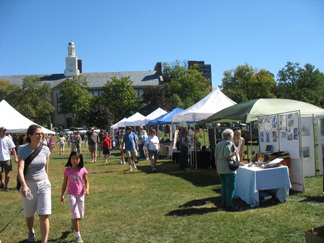CULTURALLY
SPEAKING
By
Cornelia Seckel
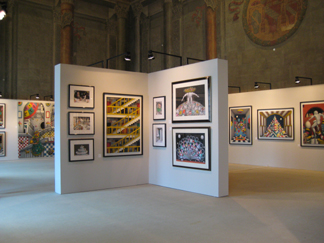 One of the galleries, before the crowds arrived, of Pier Augusto Breccia’s exhibition at the Roma Palazzo Venezia |
What a month. We were in Rome for the first week and then I didn’t
stop. Exhibitions, The Woodstock Film Festival. Raymond’s lecture at the Bruce Museum…
First
off the Lecture at the Bruce Museum: “The Art of Art Criticism” is one that Raymond has given several times;
each time I learn new things and of course he tailors it to each audience.
The room was filled with docents, artists and arts enthusiasts who truly
appreciated his thoughts and philosophy. Raymond will be talking about
“The Artist as Seer” at the Salmagundi Club, NYC on December
9th at their Brunch/Lecture series. It is open to the public so give the
Club a call and make a reservation. While I’m speaking of Raymond, several
of his paintings will be on the members’ wall at the Woodstock Artists
Association Museum during their Holiday Show and Sale opening December
4 and coming up this Spring, he will have an exhibition at the Gallery
at Mezzaluna in Saugerties. He will show Landscapes from eight different
countries, including the U.S.
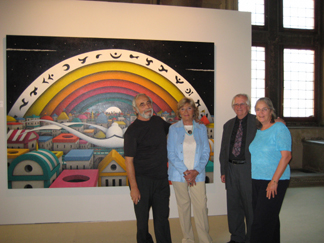 (L to R) Pier Augusto Breccia, Marissa del Re, Raymond J. Steiner & Cornelia Seckel in front of “La Città del Verbo” during the press preview of Breccia's exhibition at the the Roma Palazzo Venezia, Rome, Italy |
Each
day we were in Rome
I would say “We’re in ROME!” — not that we hadn’t been there several
times before but it was the first time our trip had a specific purpose
and we were there for 8 days. Despite the crowds, which we were unprepared
for as we have traveled in January and would hardly see another tourist,
we revisited the top sites and I got to a several markets— something
I always enjoy. We were in Rome specifically to see Pier Augusto Breccia’s
(www.pieraugustobreccia.it) exhibition at the Roma Palazzo Venezia.
Located near Capitoline Hill and built in 1455, it was one of the first Renaissance buildings
in Rome and originally inhabited by the Venetian cardinal, Pietro Barbo, who later became Pope Paul II. In 1917,
Italy regained possession of the building, and it was restored. Mussolini
used a balcony in the palazzo for many of his most notable speeches to
people gathered in the Piazza Venezia below. In the 24 years I have been
publishing ART TIMES and going to a lot of exhibitions I have never
been to an opening with thousands of people in attendance. It began at
6pm and when we arrived at 5:45 there were already hundreds of people
walking through the 4 galleries that were filled with 200 paintings &
drawings. (See the critique by Raymond J. Steiner in ART TIMES September 2007 and online. Breccia’s work, as he explains in his
critique, is unique — a fact that was not lost on the over 3000
from many continents who attended on that first day. Who knows how many
has attended since and will continue to do so until its closing on November
4?) As I walked around I heard people commenting to one another, studying
the work carefully and generally expressing (as I later learned since
I don’t understand Italian) how unique the work is – how colorful
and how stimulating. At the Press opening I met Marissa del Re,
who for many years had a very prestigious NYC gallery on 57th Street,
NYC. Although she no longer has the gallery, she is still very involved
with the arts and a friend and admirer of Breccia’s work. It was a pleasure
to meet her as I have known of her gallery and she of ART TIMES for these past 24 years.
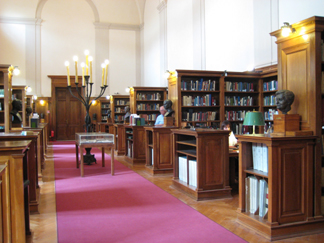 One room of the extensive library at the American Academy in Rome |
As
if our legs weren’t already ‘falling off from fatigue’ we decided to climb the Janiculum Hill
where magnificent vistas of Rome can be seen from several vantage points.
The hill was often a major defense point for the city, the last time in
1849 when Garibaldi held off attacking French troops and therefore
there are many monuments to Garibaldi in the area. Regularly we get press
releases from The American Academy in Rome about events in Rome
and in NY and knew that they were in a villa on the Hill near Porta
Settimiani. According to their literature (I couldn’t paraphrase it
better): “The American Academy in Rome is one of the leading American
overseas centers for independent study and advanced research in the fine
arts and the humanities. Inspired by their comradeship [which has remained
an integral part of the organization] in organizing America's contribution
to the fine arts at the World's Columbian Exhibition in 1893, a group,
including architects Charles Follen McKim and Daniel Burnham,
painters John La Farge and Francis Millet, and sculptors
Augustus Saint-Gaudens and Daniel Chester French, resolved
to create a center to study art amid the classical tradition of ancient
Rome. In 1894 McKim founded the American School of Architecture
in Rome. McKim involved not only artists and architects but also the great
financial geniuses of his time. J.P. Morgan, John D. Rockefeller, Jr.,
and Henry Clay Frick, all contributed to his enterprise. A
year later the American School of Classical Studies in Rome was
formed by the Archaeological Institute of America, and in 1913, a union
between the two Schools became what is now the American Academy in Rome.
Through its annual Rome Prize fellowship program, the Academy
supports up to thirty individuals working in archaeology, architecture,
classical studies, design arts, historic preservation and conservation,
history of art, landscape architecture, literature, modern Italian studies,
musical composition, post-classical humanistic studies and visual arts.
Rome Prize Fellows are chosen by juries of experts who review past work
and the proposed project of each applicant.” November 1 is the deadline
for fellowship applications.
We
rang the bell at a wrought iron gate and were let in to the inner courtyard
where we could see a beautiful villa that we later learned was the main
building (there are 18 buildings situated on 11 acres) and was designed
by McKim, Mead & White. Frencesca Strazzullo greeted us and
gave us an extensive tour of the Villa: indoor and outdoor dining area,
comfortable and homey lounges, an impressive research library with over
130,000 volumes, the beautiful grounds adorned with fruit trees, kitchen
garden and colorful parrots and the exquisite views from different balconies.
There are also rooms for Residents who are there to pursue their own work
and be mentors to the Fellows as well as a darkroom, computer room, studios
and study areas. The 17th Century Villa Aurelia has space for concerts, lectures, meetings
and celebrations as well as some overnight accommodations. A wonderful
place to pursue one’s work. www.aarome.org
 Winners and Award recipients along with co-founders ( top left Meira Blaustein & co-founder Laurent Rejto top right) of the 8th Annual Woodstock Film Festival |
The
8th Annual Woodstock Film Festival sponsored by Markertek.com, America’s largest broadcast supply house, was another huge
success with most of the 140 films sold out in advance and the panel discussions
and special events filled to capacity. Between 8-10,000 people attended
the events that were held in Woodstock, Rhinebeck, Hunter and Rosendale.
WFF co-founder Meira Blaustein said “ We are thankful to all the
wonderful filmmakers who participated in Woodstock and to all the industry
members who lent their expertise and support. Together we create a unique
event that celebrates the true art of filmmaking and provides a home for
outstanding filmmakers from all corners of the world.” The Maverick
Award Recipient was Christine Vachon of Killer Films and The Trailblazer Award went to
Ted Sarandos of Netflix. Film award winners included: August
Evening, directed by Chris Eska for Best Narrative Feature
and The Cool School, directed by Morgan Neville for Best Documentary Feature. More award winners and information
can be found at: www.woodstockfilmfestival
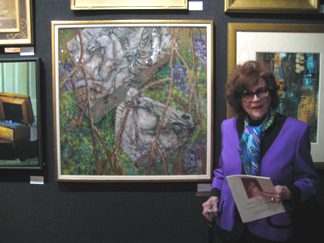 Fay Moore recipient of the ART TIMES award for her pastel “Parthenon Fragments” at the Catharine Lorillard Wolfe Art Club’s 111th Annual at the National Arts Club, NYC |
The
Catharine Lorillard Wolfe Art Club held their 111th Annual Art Open
Exhibition at the National Arts Club and each year there is a preview
reception benefiting the Metropolitan Museum of Art’s
curators for research travel. Lucille Berrill Paulsen, the club’s
immediate past president and long time board member, received the Honored
Member award for the extensive work she does for the club and for artists
in general. Lucille, a delightful and warm person, is an excellent classical
portrait artist and is quite accomplished with her still lifes and landscapes.
Congratulations Lucille. I’ve known Fay Moore for many years and
have always admired her work so I was quite pleased when the judges gave
her the ART TIMES award for her pastel “Parthenon Fragments”
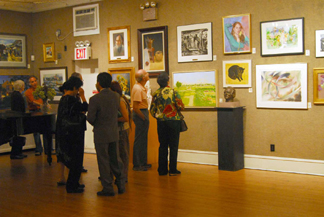 Opening reception of the Audubon Artists 65th Annual Exhibition at the Salmagundi Club, NYC |
I learned
from Raymond, one of the judges for the 65th Annual Audubon Artists
Exhibition at the
Salmagundi Club, NYC, that it was an excellent show. Su-Li Hung
received the ART TIMES award for the Woodcut “Saxophone”. Karen
Whitman (ART TIMES critique Jan/Feb 2006 issue) won the Gold
Medal for her linocut “Rooftop Rhythms”. Additional award winners can
be found on their website: www.audubonartists.org
The Arts Celebration in New Paltz, NY late in September, attended by several hundred people, was set up to bring Hudson Valley Artists, Writers and performers of mixed skill levels together to network amongst themselves and the public. There were three large tents and several long rows of tables/ booths set up for the numerous artists and cultural organizations to show their work; a resource table with information about other organizations, food vendors from local eateries with some delicious foods; ongoing music and poetry in the Performance tent. It was a family-friendly event and Children and Adults were smiling and enjoying themselves throughout the afternoon.
|
|
I got to several other exhibitions that didn’t require too much traveling: Mike Fattizzi has a show of paintings & Prints at the Doghouse Gallery, Saugerties, NY and more than any other time I’ve seen his work it impressed me as strong and gentle • TALEO is a studio for Meditation, Music, Art, Drama and Film in Woodstock, NY. Michael Brody (director/creator) is a film producer and art patron and grew up in Woodstock. For the past few months Fred Hunt, of S. Florida has been painting at the center and has many of his wonderful landscapes and waterscapes on view. In 2004, Fred was named “Miami Master” and I can see why as there is fine technique and great sensibility in this man’s work • Elliott Landy took a series of photographs of Dylan and his family at Dylan’s home in Byrdcliffe, Woodstock NY. Many of the photographs taken during that Saturday Evening Post session in 1968 are in the exhibition “Dylan In Woodstock: Photographs by Elliott Landy” at Lotus Fine Art, Woodstock, NY.
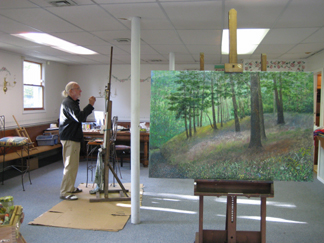 Fred Hunt (with work in foreground) at TALEO a studio for Meditation, Music, Art, Drama and Film in Woodstock, NY. |
We see more than a series of pictures of
a man’s life with his wife and child; Landy has captured an intimate portrait
of Dylan of that time and that place •
Mary Anne Erickson has a solo exhibit: “Another Roadside Distraction: The Landscape
of Vanishing America” at the Woodstock Artists Association Museum. These are nostalgic and delightful paintings
that evoked a smile and old memories as well as appreciation for the technique
and sensibility. This is part of a larger work to document roadside images
of the 50’s • Jon Campbell’s large oil paintings,
many quite abstract and provocative are on view at the James Cox Gallery
in Willow, NY. Jon is the son of Landscape painter Nancy Campbell whose work is often seen in our region.
To celebrate the 40th
anniversary of it’s public art program, NYC Parks & Recreation
is presenting 40 art installations throughout the 5 boroughs. Since 1967
The Parks Department has hosted over 1,000 temporary outdoor art displays
citywide. More details and maps of installations can be found at www.nyc.gov/parks.
Enjoy the Fall, it is so glorious.

